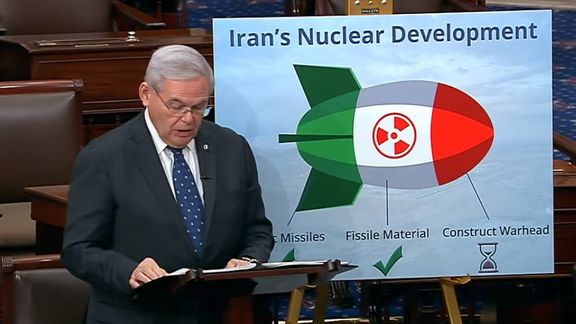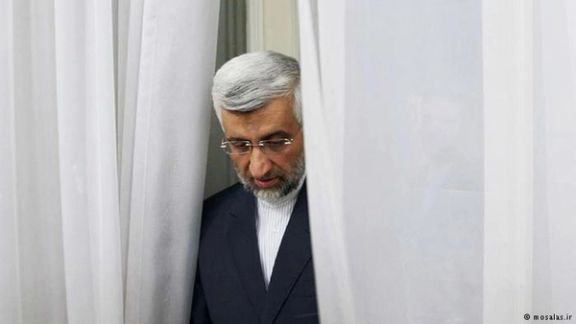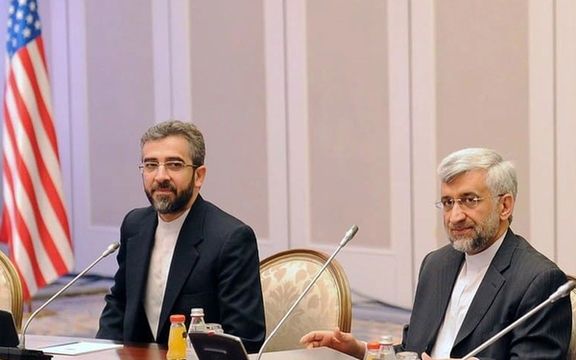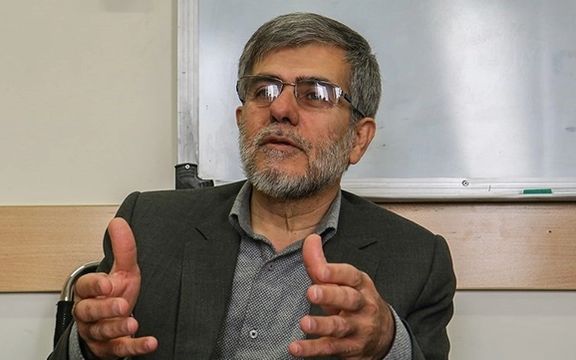Envoy For Iran Set To Face Senate Questions On Vienna Talks

The US Senate Foreign Relations Committee has asked Special Envoy for Iran Robert Malley to testify about the ongoing Vienna negotiations to revive the 2015 nuclear deal.

The US Senate Foreign Relations Committee has asked Special Envoy for Iran Robert Malley to testify about the ongoing Vienna negotiations to revive the 2015 nuclear deal.
The briefing session to update Senators on the Vienna negotiations is scheduled to be held on Wednesday, February 9, but the hearing won't be open to the public or televised.
The session was set only a day after Senator Bob Menendez asked President Joe Biden to stop the nuclear talks and adopt a tougher position on the Islamic Republic.
Menendez, the chairman of the committee, is the first senior Democrat to challenge Biden on its policies towards Iran, saying, “We cannot allow Iran to threaten us into a bad deal or an interim agreement that allows it to continue building its nuclear capacity”.
Menendez, who opposed the 2015 Joint Comprehensive Plan of Action (JCPOA) when it was negotiated by the Obama administration, said Biden should not stick to the framework that leaves “the vast majority of Iran’s nuclear program intact”.
Earlier in January more than 100 Republican members of Congress wrote to Biden asking him to stop the negotiations and get tough with Iran, which is fast enriching uranium to higher levels.
Iran’s enrichment picked up in early 2021, after Biden said he wants to restore the JCPOA and moved toward opening talks with Iran.

In the first major Democratic challenge to President Joe Biden’s Iran policy Senator Bob Menendez has asked that the president adopt a tougher position on Iran.
The Chairman of the Foreign Relations Committee on Tuesday issued his call not in a letter or a tweet, but on the Senate Floor in detailed remarks that clearly laid out his concerns over the Biden Administration’s negotiations with Iran over reviving the 2015 nuclear deal.
Over the past one year, as the Administration has embarked on a policy of reviving the agreement, Republicans have repeatedly appealed to Biden not to slacken pressure on Tehran and not to return to a deal that they argued was weak from its inception. But Democrats had largely stayed aloof, not challenging Biden’s efforts during ten months of talks with Tehran that so far have not resulted in an agreement.
Menedez, who opposed the Joint Comprehensive Plan of Action (JCPOA) when it was negotiated by the Obama administration, said Biden should not stick to the current negotiations in Vienna while Iran continues to expand its nuclear program, fast approaching the point of being able to make a bomb.
“As someone who has followed Iran's nuclear ambition for the better part of three decades, I am here today to raise concerns about the current round of negotiations over the Joint Comprehensive Plan of Action, and Iran’s dangerously and rapidly escalating nuclear program that has put it on the brink of having enough material for a nuclear weapon,” the Senator said.
He also highlighted Iran’s regional behavior and its ballistic missile programs, two issues untouched by the JCPOA, but cited as reasons by former president Donald Trump when he withdrew from the JCPOA in May 2018 and impose tough sanctions on Iran.
Menedez argued that what the Administration is negotiating about does not seem to include non-nuclear issue, or even a stronger nuclear agreement and said, “at this point, we seriously have to ask what exactly are we trying to salvage?”
The New Jersey Senator in detail explained how Iran has been circumventing US oil export sanctions since early 2021 and demanded stronger enforcement by the Biden Administration. “We can’t turn a blind eye to these violations,” Menendez said.
At the same time, the Senator proposed to establish a regional nuclear fuel bank to help Iran with fuel for energy generation, if its aim is purely civilian. He emphasized that the United States should demand that Iran immediately ratify the Additional Protocol to allow for inspection of suspect nuclear sites, ban all uranium enrichment centrifuges and close its Fordow enrichment facility.
Going beyond the nuclear issue, Senator Menendez insisted that “We cannot ignore Iran’s nefarious support for terrorism or accept threats to American interests and lives.” He added, “That is why I’m calling on the Biden administration and our international partners to exert more pressure on Iran to counter its nuclear program, its missile program, and its dangerous behavior around the Middle East, including attacks on American personnel and assets.”
He warned that the US does not know how far Iran has advanced in developing a nuclear warhead, while it is approaching the point of having enough fissile material for a bomb.
Menedez warned that Iran has reached a significant strategic power with its missile program, which by itself is a serious threat.
“It’s time to start thinking out of the box and consider new strategies for rolling back Iran’s nuclear program and addressing its dangerous and nefarious activities. These new efforts should include creative diplomatic initiatives, stricter sanctions enforcement, and a steely determination from Congress to back up President Biden’s declaration that Iran will ‘never get a nuclear weapon on my watch’,” Bob Menendez said.

Iran’s former nuclear negotiator Saeed Jalili has reportedly sent a letter to the Supreme Leader opposing nuclear talks and suggesting withdrawing from JCPOA.
Reports about the 200-page letter has been circulating in Iran for a few days, but on Tuesday Sharq newspaper for the first time revealed its content quoting “an informed source”, who said that Jalili has gone beyond criticizing the 2015 nuclear agreement.
Jalili, known as a hardliner on the nuclear issue and an opponent of the Joint Comprehensive Plan of Action, was Iran’s chief negotiator from 2007-2013, when ex-president Mahmoud Ahmadinejad’s presidency came to an end and Hassan Rouhani assumed office, bringing with him Mohammad Javad Zarif as foreign minister.
During Jalili’s tenure Iran’s nuclear diplomacy failed in finding a compromise with the West and evidence of large-scale uranium enrichment eventually led to the United Nations Security Council beginning to impose economic sanctions on Iran.
Fresh talks started in the first year of Rouhani’s presidency that eventually led to the signing of the JCPOA.
Sharq newspaper quoting its ‘informed source’ says that Jallili in his letter proposed to Khamenei to end the nuclear talks, withdraw from the Obama-era nuclear agreement and boost uranium enrichment to 90 percent, which would mean weapons-grade fissile material. Currently, Iran enriches to 60-percent purity, which has already alarmed the Western powers.

Jalili in his letter also told the Supreme Leader not to be concerned about a harsh reaction by world powers, arguing that if the West takes Iran’s case to the Security Council, Russia and China would veto any return to international sanctions. He then goes a step further and proposes to open direct negotiations with United States at that stage, from apposition of strength and extract concession, including the removal of US sanctions imposed by former president Donald Trump.
This would amount to a repeat of Jalili’s experiments when he was chief nuclear negotiator. The history of those negotiations shows that his procrastinations and hardline postures led to the international sanctions, which Russia and China did not veto between 2007-2112, banning Iran’s oil exports, weapons trades and banking restrictions.
The existence of Jalili’s letter has not been officially confirmed, but besides media reports, the spokesman of the foreign ministry, Saeed Khatibzadeh, did not deny it. When asked about his reaction to the letter on Monday, he suggested that reporters should ask Mr. Jalili and went on to say that Iran’s nuclear negotiating strategy is “decided collectively”, meaning that a range of present and former officials have input.
Sharq in its report says that before sending the letter to Khamenei, Jalili shared his views with Foreign Minister Hossein Amir-Abdollahian and current nuclear negotiator Ali Bagheri-Kani, his former protégé, but failed to convince them. After that he decided to appeal to the highest decision maker in the land.
The idea of direct talks with the United States was mentioned by the foreign minister last month, but as a part of reviving the JCPOA and not withdrawing from it.
Sharq mentions that after years of relentless attacks against the JCPOA, a large segment of hardliner conservatives faced a dilemma when Ebrahim Raisi who was representing them, became president last year and continued nuclear talks. One choice was to back down from their opposition and support the new hardliner government, and another was to continue opposing a nuclear compromise.
The newspaper commented that Jalili apparently has decided to continue playing the role of a “shadow government” and oppose negotiations and any agreement that falls short of full uranium enrichment.

Nuclear talks between the United States and Iran are in their “final stretch”, with both sides having to make tough decisions, a senior US official said Monday.
The latest talks in Vienna were "among the most intensive that we had to date" on returning to the 2015 deal formally known as the Joint Comprehensive Plan of Action (JCPOA), which former President Donald Trump abandoned in 2018, a State Department official said, according to Reuters.
Iran has refused to hold direct talks with the United States, which is present on the sidelines of negotiations between Iran and other world powers in Vienna.
"We made progress narrowing down the list of differences to just the key priorities on all sides. And that's why now is the time for political decisions," said the official, who spoke on condition of anonymity to brief reporters.
US President Joe Biden came into office a year ago promising to re-enter the deal, but Iran has continued work on its nuclear program and a deal has remained elusive.
While Iran suspended negotiation for five months in 2021, it continued uranium enrichment to up to 60-percent purity, closing the time gap to accumulate enough fissile material for a bomb. In the meantime, it increased oil exportsas the Biden Administration enforced US sanctions less vigorously.
The official said Washington has already laid out what it was prepared to do in terms of lifting sanctions that are inconsistent with the nuclear deal and that the ball was more in Tehran's court.
"Now is the time... for Iran to decide, whether it is prepared to make those decisions necessary for a mutual return to compliance with the JCPOA."
"We are in the final stretch," the official added. "Given the pace of Iran's advances, its nuclear advances, we only have a handful of weeks left to get a deal."
In the event of no deal with Iran, the official said Washington would have to step up pressure - "economic, diplomatic and otherwise" - in the face of Tehran's unconstrained nuclear program.
Washington and its European have been warning Tehran for months to speed up talks and threatened to resort to other means if agreement could not be reached, but they did not give Iran a clear deadline.
The official repeated Washington's willingness to engage with Iran through direct talks, saying it would be very much in the interest of the process given the limited time frame but added that there was no sign that they were close to doing that.
"We have not met directly yet. We have no indication that's going to be the case when we reconvene," the official said.
Iran has said it will meet with the US if it sees a clear indication that a final agreement is within reach.
Critics have saidthat the Biden Administration has not responded to Iranian provocations in the past one year and is too eager to reach an agreement rather than keep the pressure of sanctions that have put Iran in a difficult economic situation.
Israel has said it will not be restricted by any agreement that falls short of blocking all pathways to nuclear weapons for Iran, and it will reserve the right to take action.
With reporting by Reuters

Iran has told the International Atomic Energy Agency (IAEA) it will move production of crucial nuclear components from the Karaj plant to a facility at Esfahan.
The reason was not immediately clear. The IAEA said Monday it had placed seals on machines at the TESA Karaj plant and removed its cameras there as production at Karaj had "ceased."
Fars news agency reported Monday that production in the TESA Karaj plant, where Iran manufactures centrifuges, would be moved to a new “location” in Esfahan. The agency did not explain if this was part of the site where Iran converts raw uranium into feeder gases for uranium enrichment, which takes place at Ferdow and Natanz.
Fars and Reuters both reported that IAEA surveillance equipment including cameras had already been installed at the new site − Reuters dated this to January 24 – although production had not yet begun. Tehran and the IAEA have been at odds over access to monitoring equipment across the nuclear sites since early last year, when Tehran reduced its co-operation with the agency to that required by the Nuclear Non-Proliferation Treaty, and a particular dispute over Karaj was resolved only a month ago.
Under the NPT safeguards, the IAEA does not have automatic access to the manufacturing process. Under current arrangements covering nuclear sites, Iran is storing data from cameras and other monitoring equipment but has said the agency will not have access to the data until and unless the current Vienna talks agree a way to restore the 2015 nuclear deal, the JCPOA (Joint Comprehensive Plan of Action).
An IAEA report cited by Reuters said that Iran had informed the agency on January 19 that it intended to “produce centrifuge rotor tubes and bellows at a new location in Esfahan, instead of at the centrifuge component production workshop at the TESA Karaj complex, and that the Agency could adjust its surveillance and monitoring measures accordingly.”
Fars reported that Iran had not allowed the IAEA to replace equipment at Karaj, which was agreed in December, until Tehran had carried out “technical and security checks” on new cameras. Last June the site was apparently hit by a drone strike, widely attributed to Israel.
Fars noted that the movement of manufacturing took place against the background of the Vienna talks, which may resume later this week, but gave no explanation of the rationale for the shift.

Iran's former nuclear chief Fereydoun Abbasi who is a hardliner member of parliament says it is not in Iran's interest to enter direct negotiations with US.
Abbasi’s comment comes as several lawmakers have lately supported the idea of holding direct talks with the United States,
Abbasi said in an interview with Asr Iran website, "holding direct talks with America is not in our interest as long as the United States has not acknowledged that Iran is a world power."
Critics mocked Abbasi for this statement on social media. Iranian Twitter user Mohammad Hossein Karimipour wrote in response: "A country whose military budget is less than 0.5% of the rest of the world and has no air force and a seaworthy naval force fit for the oceans, and a country that cannot have financial transactions with the world, cannot be a world power. This boastful gang suffering from delusions has taken the nation hostage!"
Other critics charged that true nature of individuals such as Abbasi will be revealed only if the Russian embassy in Tehran is seized, and secrets come out. This comment implicitly referred to the seizure of the US embassy in 1979 and documents discovered.
Another critic said "These individuals benefit from Iran’s current situation. They benefit from the lack of transparency and plunder taking place in the country."
Abbasi harshly criticizing the previous government said, "While the former nuclear negotiating team led by Foreign Minister Javad Zarif believed that I am an uneducated person, the current lead negotiator Ali Bagheri Kani usually comes to the parliament and speaks with me as an expert on the nuclear issue."
Abbasi also claimed that "in order to be able to get results in the nuclear negotiations, we first need to liberate the Golan heights at the Syrian-Israeli border."
Abbasi also claimed that the current negotiations in Vienna between Iran and world powers are not about the nuclear issue. All the negotiations have been already done and their outcome is the nuclear deal called the Joint Comprehensive Plan of Action (JCPOA), he said. He added that Iran's previous government failed to have the sanctions lifted although it had promised that with JCPOA economic restrictions would be removed.
"The current negotiations are about lifting the sanctions. There is no discussion about the nuclear issue. The dossier of the nuclear talks has been closed and the other side should now fulfil their commitments under the nuclear deal," Abbasi said, adding that "No other matter including discussions about the region, our exit from the region or the issue of Iran's missile programs can be discussed as part of the Vienna negotiations."
Abbasi reiterated that Iran will enter direct talks with the United States only after Washington “treats us in the same way it deals with Russia and China,” but if Washington wants to talk with Iran from a position of power without acknowledging it as a world power, it will not be in our interest to talk with the US.
Asked if an agreement made in Vienna needs to be ratified by the Majles (parliament), Abbasi said the legislature has already approved the JCPOA. The current negotiations are not over a new agreement.
Abbasi's statement about Iran respecting its commitments under the nuclear deal is contrary to facts on the ground that indicate Iran has more centrifuges than allowed by the JCPOA and has boosted Uranium enrichment far beyond the level allowed by the nuclear deal.
Abbasi also insisted that the JCPOA's opponents have not changed their mind. This comes while some hardliner members of the parliament, particularly at the National Security and Foreign Relations Committee have recently expressed support for direct talks with the United States.
Peyman Shahbaz, a Twitter user said Abbasi was overwhelmed by his own delusion and added jokingly that "Let him be a world power for two minutes!"